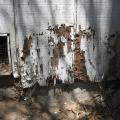What to Look For When Buying Your New Home
When buying a new home in the beginning we rarely think about any possible damages, disasters or safety. We are all overwhelmed by the exciting feeling that we are finally getting our own home. However, there are many factors to consider beyond just structural integrity and flood damage. In addition to the items on your checklist, such as checking the light quality, the electricity system and testing the water pressure, it's essential to consider any potential pest infestations as well.
How to do your own pest inspection
Check for signs of pests
Before purchasing your new home, it is good to inspect the property for any signs of pests, such as droppings, gnaw marks, and odours. You need to pay particular attention to areas that may be conducive to pests such as basements, crawl spaces, and damp areas.
Pests like mice, rats, and many insects leave behind themselves droppings that can indicate their presence. What you need to look for is droppings in areas like the basement, attic, and around the edges of the walls.
You can easily find signs of gnawing on the baseboards, door frames, and electrical wiring. Rodents, like mice and rats, are known to gnaw on wood, wires, and other materials.
In addition, some pests, such as squirrels and birds, are likely to build nests in attics and other home areas. While finding the nest itself is not that easy at first, you can check for any signs of nesting materials or holes in the walls or the roof that will help you find it.
The presence of pests can often be linked to the surrounding environment too. Taking a closer look at the area for signs of compost piles, piles of wood or leaves, or other attractants that could be harbouring pests.
Schedule a pest inspection with a professional
When buying a new home, it's crucial to schedule a professional pest inspection. A pest inspector has the knowledge, experience, and equipment necessary to identify any potential pest infestations, including those that may not be visible to the naked eye.
Some of the key benefits of scheduling a professional pest inspection are comprehensive assessment, early detection, expert advice and peace of mind. A pest control specialist will thoroughly examine the entire property, including hard-to-reach areas, such as basements, attics, and crawl spaces, where pests are most likely to hide.
Pest inspectors are trained to identify even the slightest signs of pest activity, allowing you to address the issue before it becomes a bigger problem. They will also provide recommendations for eradication and prevention, including the use of pest-resistant building materials, proper ventilation, and regular maintenance.
By scheduling a professional pest inspection, you can have peace of mind knowing that you are making an informed decision when buying your new home.
Look at the surrounding area and check for any previous pest control treatments
When looking at the surrounding area for a new home, it is important to be aware of the history of pest infestations there, as well as the potential for future ones. This can involve research on the local climate, environmental conditions, and previous pest control treatments in the area.
In addition, talking to the neighbours can provide valuable information about their experiences with pests previously, and can give you an idea of the level of pest activity in the area. Consider looking into any pest control measures that have been taken by the local authorities or homeowners in the neighbourhood. This will help you make an informed decision about the potential for pest infestations in your new home.
How much do the home exterior and interior matter
Additionally to everything mentioned, what you may want to consider when buying a new home is the condition of its exterior. Pests like termites, carpenter ants, and carpenter bees can often be attracted to homes with wood that is in poor condition. You need to inspect the exterior of the home for any signs of rot, decay, or water damage, which can make it more susceptible to pests. Along with that, you will need to inspect the condition of the home's foundation as well. As cracks and gaps can provide entry points for pests.
Another essential thing to consider is if the home has moisture problems, as pests like termites, cockroaches, and other insects thrive in damp and humid environments. Make sure there are no signs of water damage. Such can be water stains, mould, or mildew, in the basement, attic, and any crawl spaces. Keep in mind that any leaks or plumbing issues can contribute to moisture problems.
The condition of the windows and the doors will show you if there are any entry points for pests. You need to look for gaps, cracks, or damaged seals around them. Ensure that they are properly sealed to prevent bugs, insects and rodents from entering the home.
What else to check
Light Quality
Light quality refers to the amount and quality of natural and artificial light in a house. When evaluating light quality in a potential new home, it's crucial to consider both the natural light during the day and the street lighting at night.
Natural light during the day is pivotal for creating a bright and welcoming atmosphere. A sunny kitchen is a desirable feature. However, you should also check the natural light in other rooms and make sure they receive enough light throughout the day as well.
Street lighting at night is critical for safety reasons. According to crime statistics, darker streets are typically more dangerous. For this reason, it's important to visit the house at different times of the day, including night, to see how well-lit the street is. This will give you a better idea of the overall light quality and help you assess the safety of the neighbourhood.
Fireplace’s chimney
Checking the fireplace chimney is a mandatory step when evaluating a new home. The chimney is responsible for venting smoke and fumes from the fireplace, and it must work correctly.
Even though chimneys are typically installed by professionals, they may not always be well-maintained. To ensure that the chimney is functioning properly, you should check if it drafts well. A chimney that doesn't draft correctly can lead to smoke and fumes building up inside the house, which can be a fire hazard.
If you find that the chimney is not drafting correctly, you can call a chimney sweep to clean it. Cleaning is usually a simple process that can improve the chimney's performance. However, if you discover that the chimney is not working correctly after you've bought the house, it can be a significant disappointment, especially if you want a working fireplace. Repairing the chimney can be costly, so checking it before making a purchase is essential.
Water Pressure
Water pressure is an important factor to consider when evaluating a new home. To test the water pressure, you should turn on each faucet and shower in the house, and check that the flow of water is consistent and strong enough. If you find that the water pressure is too low, you may need to install a booster pump or adjust the pressure regulator. If the water pressure is too high, you may need to install a pressure-reducing valve.
Taste The Water
Tasting the water in a new home is a simple but effective way to check for any issues with the pipes. If the water has a rusty or metallic taste, it may indicate that the pipes are old and in need of replacement due to corrosion, mineral buildup, or other factors.
This is important because rust and minerals can cause discolouration and staining in fixtures and appliances, and may lead to health implications if consumed over an extended period. In some cases, old pipes may also lead to low water pressure or leaks.
Check The Drains
Checking the drains helps to identify any potential issues with the plumbing and sewer system. The best way to check the drains is to perform a functional test. This involves filling all sinks, tubs, and washing machines with water and then pulling the drain plugs at the same time. This creates pressure on the pipes and allows you to determine if there are any blockages or slow-draining areas.
A blockage in the drain can be a sign of a larger issue with the sewer line, which can be costly to repair. It can also result in unpleasant odours and leaks, causing damage to the home.
Turn The Heating/Cooling Systems
These systems play a critical role in the comfort and energy efficiency of the home, so it's essential to know if they are working correctly.
To check the heating and cooling systems, simply turn them on. Observe if they start up, reach the desired temperature, and circulate air effectively. You should also listen for any strange noises or detect any unusual odours that may indicate a problem with the system.
It's also a good idea to check the thermostat to ensure it is working correctly. This will help you to control the temperature in the home and ensure that the heating and cooling systems are functioning as they should.
Open The Electric Panel
The electric panel distributes power to all the electrical appliances and systems in the home, so it's essential to know that it's working properly. When opening the electric panel, look for any signs of damage or wear and tear, such as dirt or a burned smell. Check for any wires that are not connected to anything or are loose. Loose wires can indicate there are live wires in the walls, which could be a serious safety hazard.
Along with that, you need to check for outdated or inadequate electrical systems, such as fuse boxes that have been replaced by circuit breaker panels. Older electrical systems may not be able to handle the power needs of modern appliances, which could result in power outages or even a fire hazard.
Basement Moisture
Basement moisture is something you need to look into when buying a new home. It can indicate potential problems with the foundation or structure. Moisture in the basement can also lead to mould growth, which can cause health problems and weaken the structure of the building. To check for basement moisture, inspect the walls for any signs of dampness or mould, as well as any musty or damp odours.
Conclusion
When buying a new home, it's crucial to assess both the interior and the exterior, foundation, and surrounding area to identify and prevent potential pests and other issues. Being thorough, checking for signs of pests, getting a professional pest inspection, and considering the surroundings and the building’s qualities, can help ensure your new home is free from pests and safe for you and your family.
More to Read:
Previous Posts:








